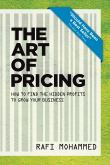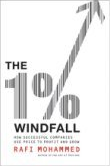The Problem with Price Gouging Laws
Reprinted from the Harvard Business Review website.
When I meet people at parties, I’m often asked, “What do you do for a living?” After sharing that I help companies improve their pricing strategies, many smirk and flippantly retort, “Oh, ripping off the consumer.” Sometimes, when I’m not in the mood to share my more benevolent philosophy of offering consumers a selection of pricing options, I simply reply, “As long as the product is not an absolute necessity, everyone always has the right to say ‘no.’” This response seems to neutralize criticism and most people nod in agreement.
But what if products are absolute necessities, such as critical supplies after a natural disaster?
Many states have anti-gouging laws that curb price increases during disasters. In California, for instance, the maximum that retailers can raise prices after an emergency is 10%. Since this minimal upcharge won’t effectively temper demand, limited supplies end up being rationed on a first-come, first-serve basis. While many view this policy as “fair,” gouging laws have two key drawbacks:
Encourages Hoarding: Those lucky enough to be at the front of the line tend to buy more than they really need. These “just-in-case” purchases — an extra loaf of bread or perhaps filling up both cars with gas — exacerbate a shortage. In contrast, doubling the price will make customers think twice about buying another gallon of milk, for example, thus leaving supply for those who didn’t arrive at dawn.
Discourages Businesses from Boosting Supplies: If prices are capped, there’s little incentive for businesses to hustle to increase supplies. It’s costly to find and transport extra products in hazardous conditions. If these extra costs eat up the profit associated with a fixed retail price, Adam Smith’s invisible hand won’t work; there’s no financial carrot. As a society, we want incentives, for instance, that divert gas tanker trucks from neighboring unaffected states to disaster areas where fuel is in short supply.
A well-known gouging case involves the invisible hand actions of John Shepperson. After the Hurricane Katrina disaster, John bought 19 generators, rented a U-Haul truck, and drove 600 miles from Kentucky to Mississippi. In return for his efforts and risk, he hoped to sell the generators at double his purchase price. Instead, he was arrested for price gouging, spent 4 days in jail, and the generators were confiscated. It’s a tricky issue: while Mr. Shepperson’s morality can be debated, his initiative would have unequivocally added supply and made some people better off. We all are charitable, of course, but how many of you would have rented a truck and driven twelve hundred miles round trip to sell generators for the price you purchased them?
To be clear, I did not come up with the above points (hoarding, discourages boosting supplies) — economists commonly use them in price gouging discussions. In fact, I paraphrased these arguments from papers written by two economists associated with the Federal Trade Commission (a government agency whose mission includes preventing business practices that are unfair to consumers), David Meyer and Michael Salinger. It’s interesting to note that a past FTC Chair, Deborah Majoras, is on record as being against Federal gouging laws.
This long-simmering “hold vs. raise prices” debate is polarizing. I’ve found that no amount of persuasive argument can change one’s views. As a society, we are at stalemate on this issue. The good news is there is another option which bridges these two opposing points of views.
Consider the following hybrid policy. During states of emergency, price gouging laws go into effect. However, federal and state governments provide subsidizes to retailers on essential products such as gasoline, primary food stuffs, and relevant construction materials. This combination of price controls and subsidies yields a best of both worlds scenario during emergencies. Prices are kept in-check and just as importantly, there are financial incentives for retailers to entrepreneurially boost stocks.
How could this be implemented? Many states have tax holidays where certain products are not taxed. The same process/technology that identifies products sold at retailers which fit the tax holiday guidelines — and then reports it to governments so they aren’t taxed — can be used to identify essential products sold during emergencies. This reporting will trigger subsidy payments.
Most politicians favor price gouging laws during a disaster over allowing market clearing prices — it’s a safe and seemingly fairer pricing choice. As a consequence, shortages and the accompanying personal miseries/health risks are inevitable. While I am rarely a fan of government subsidies, in this case — when used in conjunction with price controls — they provide both a political and economic remedy to a life-affecting pricing dilemma.




